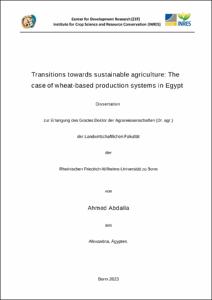Transitions towards sustainable agricultureThe case of wheat-based production systems in Egypt

Transitions towards sustainable agriculture
The case of wheat-based production systems in Egypt

| dc.contributor.advisor | Becker, Mathias | |
| dc.contributor.author | Abdalla, Ahmed | |
| dc.date.accessioned | 2023-12-11T13:15:41Z | |
| dc.date.available | 2023-12-11T13:15:41Z | |
| dc.date.issued | 11.12.2023 | |
| dc.identifier.uri | https://hdl.handle.net/20.500.11811/11171 | |
| dc.description.abstract | Egypt, the world's largest wheat importer, grapples with a critical challenge marked by a substantial disparity between its annual wheat production and consumption, with the latter doubling by 2050 due to a 1.94% yearly population growth rate. Primarily dependent on wheat imports from Russia and Ukraine via Black Sea ports, Egypt faces disruptions in its vital supply chains due to ongoing conflicts, resulting in heightened food prices and escalating food security concerns within Egypt and other nations reliant on imports. In response, Egypt aims to achieve wheat self-sufficiency, recognizing geopolitical implications. This study addresses three key areas: analyzing wheat cultivation trends from 2000 to 2020, improving wheat productivity in the Nile Delta by addressing challenges faced by smallholder farmers, and understanding the varied factors influencing wheat cultivation decisions within the Nile River Delta. The study emphasizes the significance of external pressures, such as agricultural policies, climate, and global wheat supply chains, alongside on-farm resources and domestic wheat prices as intrinsic drivers. A holistic approach is advocated, emphasizing policy reforms, resource access, and sustainable practices to enhance domestic production, thereby mitigating reliance on unreliable wheat imports and ensuring food security amid a burgeoning population and uncertain global supply chains. | en |
| dc.language.iso | eng | |
| dc.rights | Namensnennung 4.0 International | |
| dc.rights.uri | http://creativecommons.org/licenses/by/4.0/ | |
| dc.subject.ddc | 630 Landwirtschaft, Veterinärmedizin | |
| dc.title | Transitions towards sustainable agriculture | |
| dc.title.alternative | The case of wheat-based production systems in Egypt | |
| dc.type | Dissertation oder Habilitation | |
| dc.publisher.name | Universitäts- und Landesbibliothek Bonn | |
| dc.publisher.location | Bonn | |
| dc.rights.accessRights | openAccess | |
| dc.identifier.urn | https://nbn-resolving.org/urn:nbn:de:hbz:5-73472 | |
| dc.relation.doi | https://doi.org/10.3390/agriculture13010007 | |
| dc.relation.doi | https://doi.org/10.3390/agriculture13050978 | |
| dc.relation.doi | https://doi.org/10.3390/agriculture13081554 | |
| ulbbn.pubtype | Erstveröffentlichung | |
| ulbbnediss.affiliation.name | Rheinische Friedrich-Wilhelms-Universität Bonn | |
| ulbbnediss.affiliation.location | Bonn | |
| ulbbnediss.thesis.level | Dissertation | |
| ulbbnediss.dissID | 7347 | |
| ulbbnediss.date.accepted | 04.12.2023 | |
| ulbbnediss.institute | Zentrale wissenschaftliche Einrichtungen : Zentrum für Entwicklungsforschung (ZEF) | |
| ulbbnediss.institute.other | Landwirtschaftliche Fakultät : Institut für Nutzpflanzenwissenschaften und Ressourcenschutz (INRES) | |
| ulbbnediss.fakultaet | Landwirtschaftliche Fakultät | |
| dc.contributor.coReferee | Borgemeister, Christian | |
| ulbbnediss.contributor.gnd | 1382531982 |
Files in this item
This item appears in the following Collection(s)
-
E-Dissertationen (1125)




